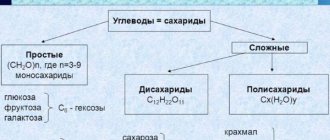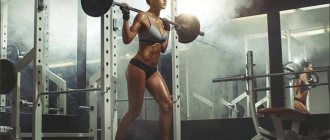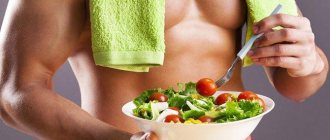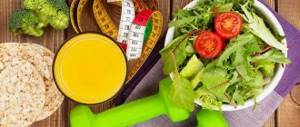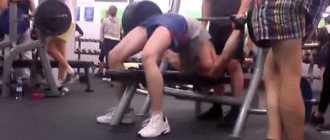Carbohydrates
Carbohydrates are one of the main sources of energy. The substances allow you to quickly obtain glucose - the sugar needed for sports, especially at high intensity, sudden movements and working with heavy weights. The storage form of glucose, glycogen, is found primarily in the muscles for quick use. After completing the exercise, energy reserves are depleted, and the body begins to absorb carbohydrates at twice the rate.
Along with glucose, muscles consume water and nutrients, which help replenish lost reserves. You can think of it as a sponge ready to absorb micronutrients.
Products for muscle pain
Discomfort after physical activity can have varying degrees of intensity. It is possible to eliminate pain not only with the help of special medications. To speed up muscle recovery, you need to include the following foods in your diet:
- dark fruits and berries that help prevent pain;
- cruciferous vegetables and leafy greens, which improve metabolic processes due to the abundance of nutrients and reduce the severity of inflammation;
- fermented milk products containing probiotics to normalize the functioning of the immune system.
To reduce the pain that often occurs after training, you should follow a drinking regime. A sufficient supply of water is especially important when playing sports in high temperatures. Lack of fluid provokes combat syndrome and causes a decrease in energy.
Attention! Muscle tissue is 80% water.
Squirrels
Protein intake is key to maintaining and building muscle mass. The substance may become even more important after exercise, especially strength training.
During training, muscle fibers are injured and protein in the body is destroyed. To correct the damage, you need to include a quality source of amino acids in your diet. In fact, adding protein is a way to build muscle. The process of protein synthesis is responsible for this. New tissues replace those that “failed” after microtrauma.
If you do not provide a sufficient amount of amino acids in the menu, then loss of muscle mass and loss of tone may occur, which will negatively affect physical fitness.
Post-workout recovery protein foods are thought to help repair damaged muscles. This leads to a potential increase in strength, endurance, and overall muscle mass.
Why do muscles hurt after exercise?
During active physical activity, neurotransmitters are synthesized, which are responsible for a positive emotional background. That is why after training there is a state of joy and satisfaction. However, after a few hours, pain may also occur, which has varying intensity. Usually, mild nagging pains do not cause significant discomfort. In some cases, an unpleasant symptom significantly reduces daily activity.
Important! Intense pain often occurs after the first workout or a long break in sports, or when the nature of physical activity changes.
Muscular discomfort indicates destruction of the muscle tissue structure. It has been proven that exercise promotes the displacement of myofibrils, the breakdown of mitochondria and an increase in the level of white blood cells.
The destruction of muscle fibers leads to the appearance of protein fragments of molecules. There is an activation of phagocytes and lysosomes, which are responsible for tissue restoration. These substances release products that cause pain. It is noteworthy that the destroyed fibers form satellites. They provoke protein synthesis in tissues.
Regular training is characterized by a gradual decrease in the severity of discomfort. Over time, the necessary amount of energy is accumulated for subsequent muscle contraction.
The following types of pain localized in the muscles are called:
- Post-workout moderate. Discomfort appears a few hours after playing sports. It may be accompanied by increased pain when stretching and contracting muscles, and fatigue. Pain is observed for several days, which indicates microtrauma in the fiber and the formation of new structures.
- Lagging. Soreness occurs 2 or 3 days after physical activity. There is pronounced discomfort during muscle stretching or contraction, which indicates that the optimal load has been exceeded.
- After an injury. Sharp and numbing pain appears during or after exercise. In this case, you need to contact a specialist and determine the cause of the pathology.
- Burning. The nature of the pain indicates lactic acid oxidation of the muscles due to overload. Usually the discomfort disappears within half an hour after physical activity.
Important! Constant exercise prevents muscle thinning. Energy capabilities increase, endurance and strength indicators increase.
A special diet can prevent or reduce pain and regenerate muscle tissue.
Fats
Although fat is burned during exercise and becomes a source of energy 40 minutes after the start, it does not need to be replenished after the gym. Mainly because the body has abundant reserves, and it is very unlikely that the “pantries” will be depleted after one session.
Rapid absorption of nutrients leads to better recovery, and fat slows down the absorption of certain substances, such as carbohydrates. Therefore, it is recommended to choose foods low in fat.
But some scientists question this advice, suggesting that consuming fat does not have a negative impact on recovery. In addition, the substances have anti-inflammatory properties, which may help reduce swelling after exercise.
There is no need to completely give up foods containing fat. Rational limits must be set.
Meal time
There is a lot of debate about whether there is a time limit for post-workout recovery nutrition to have the greatest effect. Many people may have heard the term “anabolic window”. What is this?
Muscles need fuel after the gym, and blood flow increases. When physical activity is completed, the body must replenish costs within 60 minutes. This hour is called the anabolic window.
In fact, there is no conclusive research showing exactly when to eat. Amateurs don’t care much about this, but professionals traditionally strive to eat within an hour after finishing a workout.
What if the theory is true? Then it is better to really choose an interval for eating at 20-60 minutes after completing classes.
Best Products
There is a wide range of nutritious foods that can meet your needs. Let's talk about the best options.
Simple and complex carbohydrates
Carbohydrates can be found almost everywhere. But not all of them are equally useful. The main sources of energy are found in sugary foods and everything that grows from the earth, including fruits, vegetables and grains.
All carbohydrates help fuel you, but some work faster than others. Simple ones, such as those found in white rice and sugar, are able to deliver glucose to the muscles at maximum speed. Complex ones provide more “time-stretched” energy.
Some of the best carbohydrate foods include:
- White rice.
- Potato.
- Pasta.
- Bread.
- Chocolate milk.
- Fruits.
- Oats.
Low Fat Proteins
The best foods for quick post-workout recovery are proteins. They contain all the essential AMK - amino acids. Proteins typically come from meat and fish, as well as some plants such as soy.
Dairy products may offer unique benefits due to their high levels of complete protein, simple carbohydrates, and hormones that have a positive effect on muscle gain.
There are proteins with the following types of release:
- Slow.
- Fast.
The former, such as casein, supply small amounts of amino acids for a longer period of time after consumption. The latter, for example, whey protein, are absorbed and begin to act instantly.
Scientists believe that taking both types of protein is most preferable. Fortunately, most foods contain both fast and slow proteins at the same time.
Here are some of the best complete protein options to consider:
- Chicken.
- Turkey.
- Shrimps.
- Fish.
- Beef.
- Cottage cheese.
- Greek yogurt.
- Eggs.
- Cheese.
Unsaturated fats
Healthy fats, especially omega-3s, act as powerful anti-inflammatory agents. They have a beneficial effect on the heart. Some studies show that it is for this reason that substances can improve performance.
Post-workout recovery foods that contain fat:
- Salmon.
- Avocado.
- Flax-seed.
- Chia seeds.
- Nuts and nut butter.
Foods with high nutritional value
Micronutrients, known as vitamins and minerals, can help support recovery. Foods high in antioxidants, such as vitamins E and C, are especially beneficial. Foods with potassium and magnesium are a good help for the body. And zinc is indispensable for accelerating muscle synthesis.
The easiest way to make sure your body is getting enough micronutrients is to include fruits and vegetables in your diet every day. Here are some great nutrient-rich food options:
- Greens with dark leaves.
- Carrot.
- Broccoli.
- Mussels.
- Berries.
- Bitter chocolate.
- Beans.
Sports nutrition for recovery
Before talking about the role of sports nutrition in the processes of recovery of the body after physical activity, I would like to pay a little attention to the fact that many athletes underestimate the role of recovery . Of course, if you take people who are passionate about functional training or martial arts, it is obvious that their training rhythm simply does not allow them to recover for more than a day, which is catastrophically short by the standards of our body. In such and many other cases, sports supplements will help you fully reanimate your body after training stress.
The role of sports nutrition
Sports nutrition after hard training can be used for a variety of purposes, depending on what you are trying to achieve. For example, it is important for bodybuilders to build up the most lean and high-quality muscle mass, and for weightlifters to gain strength characteristics and so-called strength endurance. Sports nutrition allows athletes to give their body most of the nutrients in a timely manner , which not only increases the productivity of training, but also affects the health and well-being of the athlete. We will talk further about how and why this happens, and about the main types of sports nutrition for recovery.
Proteins
Protein mixtures are very important for full recovery, because if your body does not receive the required amount of building materials for muscles (protein and the amino acids it contains) at the right time, then, as a result, it will begin to destroy muscle structures damaged during training.
- Whey protein, especially isolate or hydrolyzate . Whey isolates ISO-100 from Dymatize and Nectar from Syntrax have proven themselves well. Enriched with glutamine and 4-hydroxy-isoleucine, ISO Sensation from Ultimate Nutrition will help control insulin production and, accordingly, gain only lean muscle mass. Zero Carb isolate from VPX, completely free of fats and carbohydrates, can easily cope with the same task. Also check out Optimum Nutrition's Platinum Hydrowhey, which is a hydrolyzate with added BCAA amino acids.
- casein proteins protect well from catabolism for 6-8 hours . The most profitable representative of caseins is Casein Protein under the Pure Protein brand.
- However, you can kill two birds with one stone - supply the body with protein both immediately after training and over time by using a multicomponent protein: complex mixtures combine the advantages of both fast and slow proteins.
- If you want the most delicious and convenient sports nutrition for recovery, then take a closer look at protein bars: protein bars are represented by entire lines of sports chocolates from Weider and Power Sistem, as well as bars from other brands, because almost every company includes them in its product range.
Gainers and carbohydrate mixtures
High-calorie mixtures, the main components of which are proteins and carbohydrates in various ratios (with an emphasis on high protein or carbohydrate content), contribute not only to the increase in muscle mass, but also to the accumulation of energy in tissue cells.
It is especially important for muscle integrity to use a gainer before training or immediately after it during the “anabolic window” - 30 minutes, which is most important for recovery. Here, the best option for price and quality is Multicomponent Gainer from Pure Protein (high-carbohydrate gainer), but serious athletes still often prefer the “classics”: Serious Mass from Optimum Nutrition (high-carbohydrate gainer), True Mass from BSN (high-protein gainer) or Up Your Mass from MHP (high protein gainer).
During the “anabolic window”, it is advisable to use special carbohydrate products: taking 50-100 grams of moderately complex carbohydrates (most carbohydrate complexes, cereals, starchy vegetables, flour products) 30-40 minutes after training will greatly improve recovery For those prone to excess weight, we recommend consuming carbohydrates in smaller quantities and exclusively complex ones.
Creatine
To replenish the body's energy reserves, you need to take creatine after training in an average amount of 5 grams. By the way, just after a workout, creatine is absorbed as well as possible. It will reduce recovery time in both a mass gain program and a weight loss program ; creatine is especially effective after strength training or other short intense exercise. In addition, this source of ATP production reduces the activity of lactic acid,
Amino acids
Amino acid compounds already extracted from the protein structure will allow you to fill your muscles , damaged during training, with a building component much faster. Moreover, many amino acids are responsible for the recovery processes themselves, stimulating your anabolism. You can choose complex amino acids or individual ones, the most effective of the latter are:
- BCAA . A few grams of amino acids with a branched side structure will reliably protect muscles from breakdown, and also stimulate the secretion of anabolic hormones and cell growth processes in general, especially if they contain a high leucine content (for example, BCAA 8:1:1 from VPLab or BCAA Complex from Scitec Nutrition with a leucine to valine to isoleucine ratio of 8:1:1).
- Glutamine . The largest amino acid in your muscles is glutamine, so there is no need to explain how important it is to supply the body with it. In addition, about 5 grams of glutamine will not only restore muscle tissue, but also activate the secretion of growth hormone.
Vitamins and minerals
You will also need vitamins and minerals for full recovery. Moreover, do not underestimate the role of vitamins and minerals (often athletes do not get maximum results precisely because of this), because they have a huge impact not only on the processes of anabolism, but also on the entire health of the athlete as a whole, being catalysts and necessary participants in almost all reactions metabolism.
Here it is best to bet on:
- vitamins C and E , as the best antioxidants, are of great importance for the restoration of the body, since after training the level of free radicals increases many times;
- B vitamins are key for an athlete - protein synthesis, joint health, absence of injuries and cramps, and much more depend on them;
- magnesium and zinc - the macroelement magnesium is required for ATP processes, and with a deficiency of the microelement zinc, people have problems with testosterone, without a normal level of which there is no point in talking about restoration, so pay attention to ZMA supplements, which, in addition to zinc and magnesium, also include vitamin B6 for better absorption.
In addition, if you feel that your diet does not have enough sources of vitamins and minerals, include in your diet some kind of general strengthening complex containing the daily value of vitamins and minerals for an active person, and for hard training athletes we recommend serious vitamin and mineral supplements such as Animal Pak from Universal Nutrition.
Share:
Diet example
Here are some simple nutritional examples to speed up muscle recovery after an intense workout. They can be used to get the right combination of carbohydrates, proteins, healthy fats:
- Greek yogurt with fresh fruit and honey.
- Cottage cheese with banana.
- Scrambled eggs and toast.
- Mashed potatoes and chicken.
- Marinated shrimp with rice.
- Assorted cereals with salmon.
- Boiled chicken fillet with herbs.
Goals
Athletes have 3 main goals:
- Fat loss.
- Muscle building.
- Increased endurance.
Let's talk about how products for quick muscle recovery after a workout help you achieve a certain goal.
Fat Loss
BJU: 40/35/25.
The main goal is to reduce your carbohydrate intake. This may cause some difficulties. It is difficult to maintain a routine when you play sports. Therefore, a number of factors need to be taken into account:
- How many calories have already entered the body?
- Did you eat before training?
- How long did the physical activity last?
You need to roughly calculate your energy consumption so that you don’t overdo it with carbohydrates and fats.
Muscle building
BJU: 30/30/40.
Without consuming the right amount of proteins and carbohydrates, muscle growth is impossible. Therefore, the level of sufficient consumption should be taken into account:
- Proteins: 0.3-0.5 g per kg of weight.
- Carbohydrates: 1-1.5 g per kg of weight.
It turns out that for an athlete weighing 80 kg, 24-40 g of protein and 80-120 g of carbohydrates will be enough.
Top 7 Best Foods for Post-Workout Muscle Recovery
Tissue regeneration is carried out by replenishing glycogen stores. After physical activity, you need to consume carbohydrate foods. To restore muscle fibers, it is recommended to include easily digestible proteins in the diet.
Foods that promote muscle regeneration belong to different groups. Products for rapid muscle recovery after exercise include various names.
Chicken and quail eggs
This is an excellent source of protein. The advantage of this product for muscle recovery is the presence of leucine. The amino acid helps build muscle. Egg white increases energy production and also stimulates protein production. The presence of antioxidants important for health and well-being: selenium, lutein, zeaxanthin is essential.
Eating eggs reduces the severity of inflammatory processes in muscle tissue
Cottage cheese
Fermented milk products include casein, which is classified as a slow carbohydrate. Its complete absorption occurs within 8 hours. During this period, the muscles receive the necessary nutrients for recovery. The product is recommended to be consumed before bedtime or before a long break from eating. This is due to its prolonged digestion.
Nutritionists recommend consuming high-fat cottage cheese to saturate muscles with calcium, vitamins and amino acids
Green tea
Intense exercise leads to the production of free radicals. These harmful substances negatively affect the body, promoting the formation of malignant tumors. Green tea helps neutralize free radicals.
The drink does not remove water from the body, which is especially important during active physical activity.
Spinach
The leafy vegetable is rich in beneficial antioxidants. Muscle recovery occurs due to the presence of magnesium. Folic acid included in the composition takes part in RNA synthesis and cell renewal.
Spinach is recommended to be included in the menu for athletes
Fish
Products that restore muscles after a workout include mainly fatty varieties. For example, herring is rich in creatine. This substance helps build muscle tissue. Salmon reduces the concentration of bad cholesterol.
Smoked or salted fish removes fluid from the body due to a significant amount of salt
Hard cheese
It is known that active muscle recovery occurs when a person sleeps. Hard cheeses are rich in an amino acid called tryptophan. This substance affects the production of the sleep hormone.
The product contains calcium necessary for adequate functioning and restoration of muscle tissue
Nuts
Almonds influence the process of muscle recovery. The product contains healthy fats (Omega-3, Omega-6). Brazil nuts increase testosterone. They are distinguished by the presence of magnesium, selenium and zinc. Walnuts are also a source of nutrients.
We recommend reading: What are the benefits of almonds, properties and contraindications
Nuts relieve fatigue and provide the body with energy


